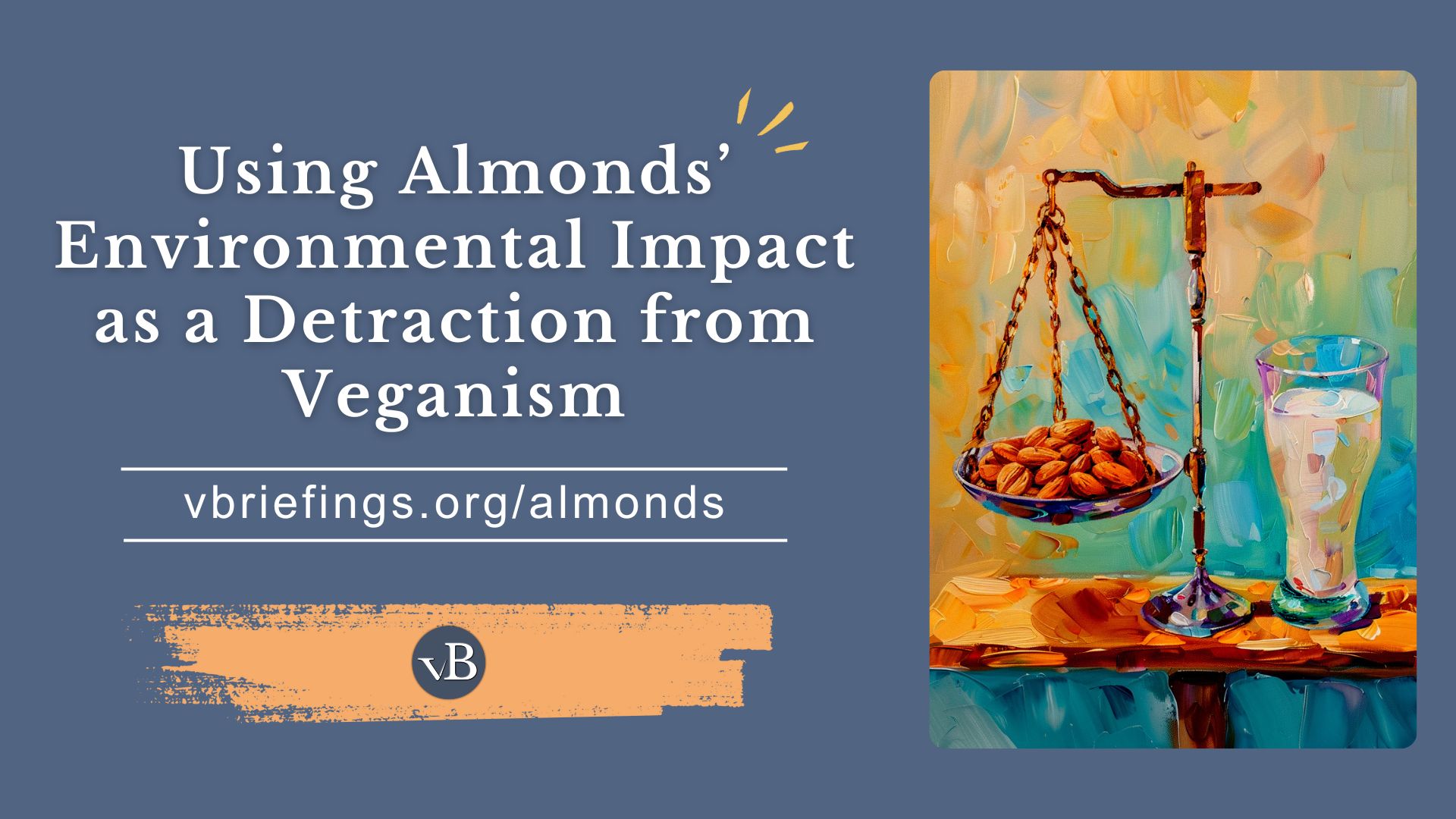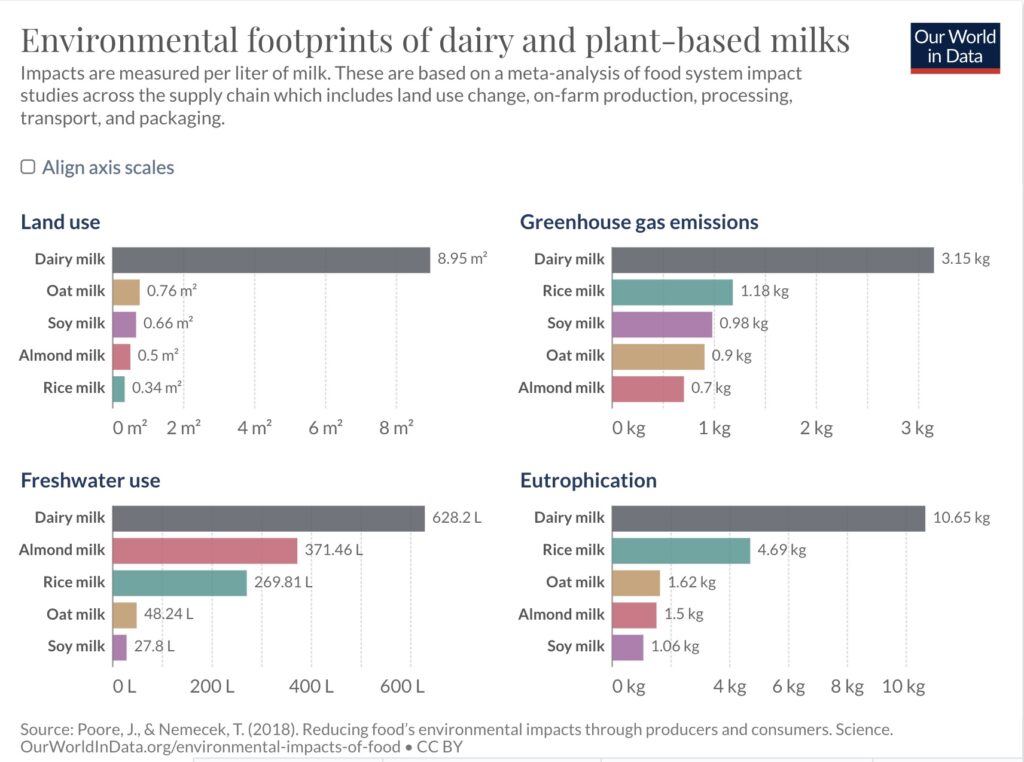Preface
Briefing description and more.
This briefing examines why using almond production’s environmental impact to distract from veganism is both logically flawed and environmentally unsound.
Companion Videos
How to use companion videos
Videos may be posted on multiple social media platforms, and you can share them on each platform according each platform’s conventions.
Share this Briefing
Social Media Sharing Image
This image will be used when sharing the briefing on a social media platform. You can see all social sharing images in the grid view.

How to share this briefing
Click on the icon for the platform on which you wish to share. What happens next depends on the platform, but generally a popup will appear, letting you add your own text as you share.
Briefing Meta
Metrics
Note: we will publish additional briefings after completing flashcards and presentation slides for selected briefings.
Counts:
| Main Text | |
| Key Points | 3 |
| Counterclaims | 0 |
| Supplementary | 5 |
| Further Study | 2 |
| Footnotes | 8 |
| Media & Advocacy | |
| Advocacy Notes | 9 |
| —Socratic Questions | 17 |
| Flashcards | 25 |
| Presentation Slides | 0 |
| Memes & Infographics | 0 |
| Companion Videos | 0 |
Other Meta:
Date Posted:
Last Edited:
Edit Log:
Key Points Links
Loading…
Help Us Improve
Please send your suggestions for improvements, or report any issues with this briefing to team@vbriefings.org
We appreciate that you are taking the time to help up improve. All suggestions and reports will be carefully considered.
Summary
A concise summary of the briefing (see below for citations).
Using almond production as a criticism of veganism and a justification for animal cruelty is flawed. Vegans can avoid almonds and still be vegan, and comparing environmental impacts to the violence of animal agriculture is a category error. While almond farming uses more water than some crops, almond milk and other plant-based milks have far lower environmental impacts than cow’s milk in terms of land, water use, greenhouse gas emissions, and eutrophication, as shown in a major global study.
Context
Places this topic in its larger context.
Detractors from veganism often point to the environmental impact of almonds as an attempt to discredit veganism and divert attention away from both animal ethics and the environmental devastation caused by animal agriculture.
In the bigger picture, neither vegans nor anyone else is required to use almond milk or almonds in any capacity. So the point about almonds is flawed anyway.
Key Points
This section provides talking points.
This is not a vegan issue.
Vegans can choose not to consume almonds and still be vegan.
This point may seem obvious, but it highlights the fact that it is illogical to say that veganism is problematic, or that vegans are hypocrites, because almonds are a plant and not a product of animal agriculture.
As an analogy, it’s nonsensical to say that veganism is problematic because addictive substances are derived from plants and not from animals, or to say that vegans are hypocrites because some vegans may be drug addicts.
Vegans are often at the forefront of advocating for sustainable and environmentally friendly practices, so it’s likely that many vegans choose other nuts and nut milks over almonds and almond milk because of almonds’ environmental impact relative to other nuts.
Comparing the relative environmental impacts of one particular nut to violent slaughter and cruelty is a category error.
Veganism focuses on avoiding animal exploitation and suffering as much as possible. Almonds, while potentially resource-intensive compared to other nuts, do not contribute to animal suffering in the same way animal agriculture does.
Attempting to invalidate veganism based on the environmental impact of a single nut, which individuals can choose to avoid, is not a sound argument.
Compared to just almond milk, cow’s milk has a much higher environmental impact.
Almond milk is still lower in water use than cow milk, and results in far fewer emissions, far less land use, and far less eutrophication than cow milk, as shown below.
Cow milk compared to almond milk in particular:
- causes over 4 times the GHG emissions
- uses over 17 times more land
- causes over 7 times the eutrophication
- uses over 1.6 times as much water.1
Note: The data analyzed was largely from the 2018 Joseph Poor led study from Oxford which has been called “the most comprehensive analysis to date of the damage farming does to the planet,” having examined 38,700 farms in 119 countries representing 90% of the world’s protein and calorie consumption. (The Guardian2; “Reducing food’s environmental impacts through producers and consumers”, published in Science Magazine3)
Counterclaims
Responses to some yes but retorts.
Counterclaims are often not included in objection-type briefings because the objection itself functions as a form of counterargument.
Supplementary Info
Additional information that may prove useful.
We’ve compared almond milk to cow’s milk, but it’s also telling to add other plant milks into the comparison. All plant-based milks significantly outperform cow’s milk on all environmental impact measures.
Using data produced by the comprehensive 2018 Oxford study, analysts found that “Cow’s milk has significantly higher impacts than the plant-based alternatives across all metrics.”
Cow’s milk….
- “causes around 3 times as much greenhouse gas emissions;
- “uses around 10 times as much land;
- “uses 2 to 20 times as much freshwater;
- “and creates much higher levels of eutrophication.”4
Note: The data analyzed was largely from the 2018 J Poor led study from Oxford which has been called “the most comprehensive analysis to date of the damage farming does to the planet,” having examined 38,700 farms in 119 countries representing 90% of the world’s protein and calorie consumption. (The Guardian2; “Reducing food’s environmental impacts through producers and consumers”, published in Science Magazine3)
The visual below is from OurWorldInData.org 7

Further Study
Sources providing a deeper understanding of the topic or related topics.
Other Resources
The Food Revolution Network article “Are Almonds Sustainable?” acknowledges the high water usage but argues that almonds are more water-efficient than dairy and beef production, and that the industry is working on reducing water use and bee-related issues.8
Advocacy Resources
Information to help with outreach and advocacy.
Note: we will publish additional briefings after completing flashcards and presentation slides for selected briefings.
Share This Briefing
Cloned from the Preface Section on page load.
Companion Videos
Cloned from the Preface Section on page load.
Memes and Infographics
No images found.
How to use Memes and Infographics
To sequence through all memes and infographics on this page, click on any image than use the arrow keys or the arrow buttons to show next and previous images.
To share a meme or infographic, right click on the image and choose download or save as. Then upload the image to the platform of choice.
Presentation Slides
Slides not available.
How to Use the Presentation Slides
You can view the slideshow full screen by clicking on the first link above.
To use Canva presenter mode, view the speaker notes, or download the slides as PowerPoint, login to Canva (the free account works) and follow the Full Canva Link provided above.
To copy this presentation to your own Canva project, use the Full Canva Link provided above, then select File->Make a Copy from the upper left. You can build your own unique presentation from multiple briefings by copying the presentation from each briefing and then building another presentation from the copied presentations.
Flash Cards
We partner with Brainscape because of their excellent features for learning. You will need to create a free Brainscape account to study the cards.
Go to Flash Cards: This will take you to a list of decks.
About Flash Cards and Brainscape
Flash cards are here to help you commit important facts and concepts in this briefing to memory.
In Brainscape, there is one deck for each briefing. You can study more than one deck at a time. Brainscape uses spaced repetition to promote memory retention. It is “the secret to learning more while studying less.”
You can study using your browser, but Brainscape also has a free mobile app that makes learning anywhere easy.
Socratic Questions
Socratic-style questions are embedded in the Advocacy Notes below, and shown in italics.
These are open-ended, thought-provoking questions designed to encourage critical thinking, self-reflection, and deeper understanding. They are inspired by the Socratic method, a teaching technique attributed to the ancient Greek philosopher Socrates, who would ask his students probing questions rather than directly providing answers.
The goal is to help people examine their beliefs, clarify their thoughts, uncover assumptions, and explore the evidence and reasoning behind their ideas.
Advocacy Notes
Tips for Advocacy and Outreach
General Tips
Some people attempt to discredit veganism by pointing to the environmental impact of almonds, using it as a detraction from the ethical case against animal agriculture. Your goal is to help them recognize that this argument is flawed, misplaced, and does not justify animal exploitation.
Segue the Conversation Back to Animal Ethics
Bring the discussion back to the ethical reasons for being vegan as soon as you can. Point out the category error.
- “Are you really comparing the environmental impact of almonds to the direct violence and suffering involved in raising and slaughtering animals? How does that make sense? Isn’t that a category error?”
- “Even if almonds were environmentally damaging, would that justify the killing and exploitation of animals?”
- “When we have the option to choose foods that minimize harm to both the planet and animals, why wouldn’t we?”
Why? This keeps the focus on ethics instead of letting them use this argument as a distraction, and exposes the flawed logic of using almonds to justify harming animals.
Expose the False Link Between Almonds and Veganism
The argument against almonds does not undermine veganism because veganism is not dependent on almonds.
- “Will you acknowledge that vegans can choose to not eat almonds and still be vegan?”
- “If someone chooses not to consume almonds, are they no longer vegan?”
- “How does the environmental impact of one specific crop diminish the ethical principle of avoiding harm to animals?”
Why? This forces them to acknowledge that veganism is about avoiding animal exploitation, not about specific food choices.
Show That This Argument Distracts from Animal Agriculture’s Impact
The discussion about almonds is often used to deflect from the far greater environmental harm caused by animal agriculture.
- “If environmental impact is the concern, wouldn’t it make more sense to discuss the biggest contributors, like meat and dairy, instead of one nut?”
- “Why focus on almonds when the livestock industry is responsible for the much of deforestation, water use, and greenhouse gas emissions?”
Why? This refocuses the conversation on the true driver of environmental destruction—animal agriculture.
Highlight That Almond Milk Is Much More Sustainable Than Dairy
Even if someone is concerned about almond production, dairy is far worse for the environment.
- “Did you know that cow’s milk causes over four times the greenhouse gas emissions and uses 17 times more land than almond milk?”
- “If water use is a concern, why focus on almonds when dairy requires even more water per liter of milk?”
Why? This forces them to acknowledge that dairy is the far worse option.
Emphasize That Plant-Based Milks as a Whole Outperform Dairy
Some assume almond milk is the only alternative to dairy. Help them see that there are many environmentally friendly plant-based options.
- “If you’re concerned about almonds, have you considered oat, soy, or hemp milk, which have even lower environmental impacts?”
- “Since all plant milks require fewer resources than cow’s milk, why not choose the most sustainable option?”
Why? This shows them they can address their concerns while still avoiding animal exploitation.
Show That Many Vegans Avoid Almonds for Environmental Reasons
Vegans are often at the forefront of sustainability efforts.
- “Are you aware that many vegans choose plant-based milks with lower environmental impacts than almonds?”
Why? This helps undermine the claim that veganism is tied to almond consumption.
Reframe the Discussion Around Ethical Consistency
Those bringing up almonds often do not apply the same scrutiny to their own diets.
- “If you don’t consume almonds because you are concerned about the environment, why would you consume animal products that have a much larger environmental impact?”
- “Wouldn’t someone who genuinely cares about sustainability be more concerned about cutting out the biggest contributors to environmental harm?”
Why? This encourages them to apply their reasoning consistently.
Address the Underlying Motivations Behind This Argument
Some may use the almond argument not because they care about sustainability, but as a way to avoid questioning animal exploitation.
- “Is the concern really about the environment, or is it a way to dismiss veganism without engaging with its ethical basis?”
- “If someone genuinely cares about sustainability, wouldn’t they be advocating for reducing animal agriculture rather than using almonds as a distraction?”
Why? This helps them recognize that this argument is often a diversion rather than a sincere concern.
Footnotes
Our sources, with links back to where they are used.
- Ritchie, Hannah. Dairy vs. plant-based milk: what are the environmental impacts? Our World in Data Research Group. January 19, 2022. ↩︎
- Carrington, Damian, Environment editor. “Avoiding Meat and Dairy Is ‘Single Biggest Way’ to Reduce Your Impact on Earth.” The Guardian, May 31, 2018. sec. Environment ↩︎
- Poore, J., and T. Nemecek. “Reducing Food’s Environmental Impacts through Producers and Consumers.” Science 360, no. 6392 (June 2018): 987–92. ↩︎
- Ritchie, Hannah. Dairy vs. plant-based milk: what are the environmental impacts? Our World in Data Research Group. January 19, 2022. ↩︎
- Carrington, Damian, Environment editor. “Avoiding Meat and Dairy Is ‘Single Biggest Way’ to Reduce Your Impact on Earth.” The Guardian, May 31, 2018. sec. Environment ↩︎
- Poore, J., and T. Nemecek. “Reducing Food’s Environmental Impacts through Producers and Consumers.” Science 360, no. 6392 (June 2018): 987–92. ↩︎
- Ritchie, Hannah. Dairy vs. plant-based milk: what are the environmental impacts? Our World in Data Research Group. January 19, 2022. ↩︎
- Robbins, Ocean. “Are Almonds Sustainable?” Food Revolution Network, 7 June 2019. ↩︎




